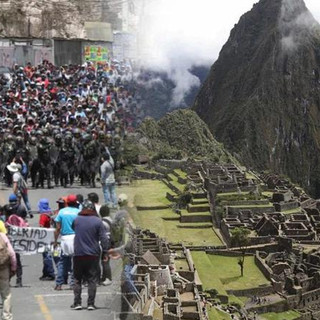In April 2021, Pedro Castillo, a former rural school teacher, union leader and son of illiterate parents, who moved to the capital Lima as a youngster to clean hotel rooms, won the second round of the presidential election with just 0.3% difference and a turnout of nearly 75%. His opponent was right-wing candidate Keiko Fujimori, the daughter of former Peruvian corrupted dictator Alberto Fujimori, who ruled the country from 1990 to 2000 by combining pro-free market policies with political repression, including fighting a Marxist terrorist organization called Shining Path.
As a populist left-wing Peruvian president, Castillo attempted to dissolve the national Congress earlier this month and rule by decree as a dictator. Shortly after, the most important ministers of his team resigned, Castillo was betrayed by close collaborators and arrested within a few hours. Dina Boluarte, Castillo's moderate left-wing vice president, was immediately sworn into office, becaming Peru’s sixth president in five years and the first female in the country to reach that position.
Following this failed coup d’État, Castillo's supporters have protested blocking major airports and roadways throughout the country, causing at least 26 people to lose their lives in the clashes between protesters, the police, and the army.
Although his party was openly communist, when Castillo won the elections, he declared that he rejected Venezuelan socialism, accused Venezuelan refugees for being responsible of the rising national crime, condemned Marxist guerrilla's terrorism, promised that his land reform will not involve expropriations, and firmly rejected abortion and same-sex mariages. In his first months as president, he announced an increase of the monthly minimum wage from $223 to $250, the sale of government civilian airplanes, and a ban on business-class travel for public servants.
Despite strict lockdowns and mask mandates, Peru has been the country with the highest Covid deaths per capita in the world, doubling other highly affected countries like Brazil and Mexico. Following the pains of the pandemic, Castillo vowed to increase the vaccination rate in order to "return to normality as soon as possible", and the economy reported this year a record GDP growth of 12%.
However, Castillo's presidency was mostly characterized by widespread corruption and political instability. With solid evidence presented by the General Attorney, he and many members of his family faced six corruption investigations, including heading a criminal organization in bidding processes to obtain illicit gains involving taxpayers money. On the political side, Castillo had seven different Interior Ministers and four Prime Ministers that had been removed or resigned themselves, his allies controlled less than 50% of the Congress, and had only 20% in approval ratings, one of the lowest in the world.
In this environment, Castillo survived two impeachment processes, but in last October, five of his political allies were detained on corruption charges. Moreover, the Congress had denied Castillo travel abroad to attend Colombia's new left-wing president Gustavo Petro ceremony of inauguration, and to assist to the annual Pacific Alliance trade bloc meeting in Mexico, which caused the hosting president, López Obrador, to cancel the event. As a result, Castillo announced plans to “temporarily” dissolve the Congress and rule by decree to “re-establish the rule of law and democracy” in Peru. This was widely condemned as an attempted coup d'État, and several government ministers resigned in protest.
Following Alberto's Fujimori dictatorship, Peru has a law that makes it possible for the Congress to remove the president without any cause if at least two-thirds of its members decide it. On this occasion, the Congress, which had only 11% of approval rating and was branded by Castillo as "a nest of snakes of the wealthy establishment mafia", quickly held a new third impeachment trial to remove Castillo.
After the impeachment vote, that got 101 out of 130 supporting it, Castillo was arrested on charges of the crimes of “rebellion” and “conspiracy” for breaking the constitutional order as he was traveling to the Mexican Embassy to request asylum. The armed forces have sided with Boluarte and the US has recognized her as the official head of state.
The impeachment led Castillo's supporters, mainly from rural areas, to hold violent demonstrations that have paralyzed many activities, including the air and railway transport and major motorways. Following pro-Castillo supporters claim that "they want a president that they elected, and not imposed", Dina Boluarte announced anticipated national elections to be held in 2024, instead of the planned in 2026. This measure is supported by 85% of the population, and so the protests have cooled down.
Meanwhile, Castillo is still arrested, and his family was granted asylum at the Mexican Embassy in Lima. López Obrador broke Mexico's tradition in foreign policy of not interfering in other countries internal matters by not recognizing the new government, causing the Mexican Ambassador to be expelled from Peru.
In the last 40 years, Peru has experienced an unusual mix of high economic growth with very unstable political conditions, and so far it seems that this will continue to be the case unless reforms to give the president more stability with a democratic and egalitarian framework can be achieved.













Comments